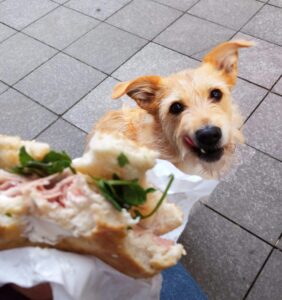Summer cookouts, family picnics, and backyard BBQs are some of the best parts of the season. For dog owners, it is tempting to share a bite or two with your furry friend. However, not all summer foods are safe for canine consumption. In fact, some seasonal favorites can lead to upset stomachs, illness, or even a trip to the emergency vet.
In this post, we are diving into which foods are safe to share with your dog and which should be kept far from their bowl. Understanding summer food safety can help you enjoy the season while keeping your dog healthy and happy.
Safe Summer Foods for Dogs
If you want to include your dog in your summer meals or training sessions, these foods are safe in moderation:
Watermelon (seedless and rind-free)
This juicy fruit is a great source of hydration. Be sure to remove seeds and rinds to avoid digestion issues.
Blueberries
Packed with antioxidants, blueberries make a healthy, low-calorie treat. They are perfect for freezing and offering on hot days.
Carrots
Carrots are crunchy, nutritious, and low in calories. Offer them raw or cooked without seasonings.
Plain grilled chicken
As long as it is boneless, skinless, and free of sauces, grilled chicken is a lean protein your dog will love.
Sweet potatoes
Cooked and plain sweet potatoes are rich in vitamins and easy to digest. Avoid butter, sugar, or spices.
To use these foods safely during training, consider offering small bite-sized pieces as rewards during obedience sessions. Our Basic Obedience Training for Reactive Dogs uses food motivation to teach structure and impulse control, even during backyard distractions or summer events.
Dangerous Foods to Avoid
Many common summer treats may seem harmless but can be harmful or toxic to dogs. Avoid giving your dog these items:
Grapes and raisins
Even small amounts can cause kidney failure. Keep fruit salads out of reach.
Corn on the cob
While plain corn kernels are safe in moderation, the cob can cause choking or intestinal blockage.
Onion and garlic
These are toxic to dogs and are often hidden in marinades, sauces, and dips.
Avocados
Contain persin, which can cause vomiting or diarrhea in dogs.
Alcohol
Dogs are extremely sensitive to ethanol. Even small sips can lead to poisoning.
Cooked bones
They may splinter and cause choking or damage to the digestive tract.
Dropped food at parties or under the table can quickly lead to trouble. Reinforcing the “leave it” or “place” command during outdoor meals will prevent your dog from scavenging. For more strategies, read our guide on how to prevent your dog from darting out the door this summer. Many of those same boundary-setting techniques apply to food control as well.
Summer Treat Safety Checklist
Before sharing any food, ask yourself the following:
- Is the food non-toxic to dogs
- Does it contain any sauces, seasonings, or artificial sweeteners
- Is it soft and easy to chew or a potential choking hazard
- Is this a small treat or a frequent indulgence
- Is it fresh and served at a safe temperature
If you hesitate to answer yes to any of these, it is safer to skip sharing that food.
Safe Treat Alternatives
Want to involve your dog in the cookout without compromising their health? Try these alternatives:
- Freeze dog-safe fruits like blueberries or watermelon in ice cube trays
- Fill a Kong toy with plain Greek yogurt and freeze it
- Create a “dog plate” with plain cooked veggies, grilled chicken, and sweet potato
These alternatives can turn snack time into training time and offer a great way to practice commands in a stimulating environment.
Spoilage Risks in Hot Weather
Hot summer temperatures can spoil food quickly. Do not leave cooked meat or dairy outside for long, and never allow your dog to pick food off unattended plates. Spoiled food can cause digestive upset or food poisoning. Always discard leftovers promptly and keep trash bins secured.
External Resource
For a comprehensive list of foods that are toxic to dogs, visit the ASPCA’s guide to people foods to avoid feeding your pets.
Final Thoughts
Feeding your dog from your summer plate may feel like a kind gesture, but it is important to know what is safe and what is not. The good news is that with a little planning, you can share the season without risking your dog’s health.
Training plays a key role in keeping your dog safe around food and distractions. Whether your pup needs help resisting temptation or learning to stay calm around company, obedience work builds the foundation for a safer and more enjoyable summer.
Contact us today to schedule a training consultation and enjoy a more relaxed, rewarding summer with your dog.


